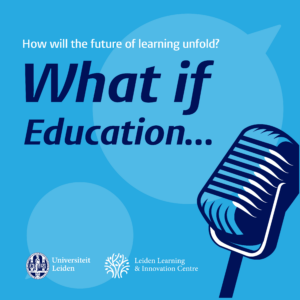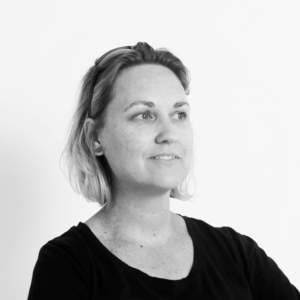What if Education… Podcast
Can we change the way we educate? Do we need to change? How about, do we even want change?
Taking a slightly unorthodox approach, in each episode, teachers, students and experts share their ideas of how they think the future of education will unfold. The host, Monika Theron, evokes free-thinking by sneaking controversial topics into conversations with her guests. Monika wants to find out how comfortable educators and learners are with new and developing concepts in education.
Expected outcomes: crazy ideas, humour and open-minded conversations.
Navigate to information on: Series 1 | Series 2 | The Host | The Guests | Sharing & Downloads | Useful Links
Subscribe and listen on…
Series 2
Playful Learning
“Play stimulates flow state (also known as being in the zone) and a mindset in which students take more risks, which is ideal for learning.” After recently reading this in an article I had to find out more, and here we are a new episode of What if Education… Playful Learning.
In this episode we dive into the differences between playful learning and gamification, what to consider when implementing playful learning into higher education and imagining a university where playful learning becomes part of the curriculum.
My colleague and guests from Leiden University joining in on this conversation are Tanja de Bie, Online Platform and Community Management Specialist at the Centre for Innovation, Assistant Professor Carjlijn Bergwerff, at the Programme Group Clinical Neurodevelopmental Studies and Student of Master Psychology Liudvikas Pikutis specialising in Methodology and Statistics.
What are you waiting for? This episode is great!
![]()
Download the transcript of this episode.
Links: Player Taxonomy | Defining Playful Learning | Best Practices of Playful Learning at Leiden University | Gamification v. Game-based Learning v. Playful Learning | Comenius Netwerk | Praktijk Present | Can Playful Learning Save Education? Becky Stirrup, TEDxUniversityofLeeds
Subscribe and Listen on: Spotify | Apple
Humanities’ alternative model for academic development
Think about how higher education is currently organised and now try to think how it could go beyond disciplinary specialisations where locally situated scholars, workers, artists, activists, community-based practitioners and associations contribute to education through participatory approaches. What can we learn from engaging with them? In what ways can their voice enrich classroom learning and bring meaning to academic quests?
These are the questions that the International Institute for Asian Studies (IIAS) and the Humanities Across Borders (HAB) program are trying to answer. Please join me, Monika, Dr Philippe Peycam – Director of IIAS, Dr. Aarti Kawlra – Academic Director of HAB and Orraya Chawnan – student at Chiang Mai University.
![]()
Download the transcript of this episode.
Links: International Institute for Asian Studies (IIAS) | Humanities Across Borders (HAB) | Dr. Philippe Peycam | Dr. Aarti Kawlra | Orraya Chawnan | Newsletter 82 Spring 2019 “Living with and in the Forest in Northern Thailand” | A Humanist Model of Collaborative Higher Education
Subscribe and Listen on: Spotify | Apple
The future of XR within education
This episode is somewhat of a personal interest of mine that I am very happy to share with you, titled “The future of extended reality (XR) within education”.
Please join me, Monika, my co-host Thomas Ginn, who is Centre for Innovation’s VR filmmaker and my guests, Sander Veenhof a developer and artist of AR/VR as well as Mitchell Bosch a media technology student at Leiden University.
The topics we tackle are of course how we see XR implemented in the future of education. What should we look out for, especially regarding our own privacy, when using these devices and then some ideas how to tackle these issues in the future?
Links: XR ERA: The Centre for Innovation, Leiden University, community-driven platform for extended reality in education and research in academia. | Our Extended Reality for Learning and Working Theme | Sander Veenhof: Be your own Robot (also on Dutch Design Week) | Sander Veenhof on Futurotheek | Do you need a mobile phone? 1999 | Minority Report | Ted Chiang – Exhalation | Hyper-Reality
Subscribe and Listen on: Spotify | Apple
Convenience of digital tools
In this episode, titled “Convenience of Digital Tools” the focus is based around a fictional digital tool we created to solve some issues within education. The idea was to see if the tool can help the teacher or student with some of the issues they experience with online education. The guests did not know that the tool created was fake, right up to the moment of being interviewed.
Did this digital tool live up to their expectations? Please join Monika, her co-host Joanna van der Merwe, Centre for Innovation’s Privacy Protection Lead and her guests Daan Romein, Team Leader Professional Development and Educational Innovation at Leiden University and Bastian Mielke, a second-year student of Global Public Health at Leiden University College (LUC).
Subscribe and Listen on: Spotify | Apple
Education for sustainability: A look into the future
What does sustainability mean to you? How does it or has it affected you in your own life? Should universities be the leaders in educating people how to be more sustainable?
Listen to Monika and her guests David Zetland a university lecturer in political economy at Leiden University College (LUC) and Soem Zeijlmans, a recent graduate majoring in Governance, Economics, and Development from LUC, as they dive into sustainability topics, share their experiences and of course the “What if’s”.
Series 1: Education in 2030 (3-part)
Education in 2030: Part 1
Monika speaks to Dr. María Gabriela Palacio, Assistant Professor of Development Studies, Social Policy and International Studies at Leiden University and Nicole Kadlec currently a student of International Studies as well as an assistant student working at the Centre for Innovation, also at Leiden University.
The curveball in this 3-part series: the education of the future uses micro-chips and social scoring. How do the guests feel about it?
Subscribe and Listen on: Spotify | Apple
Education in 2030: Part 2
We are joined by Jaap Brons, a History teacher, currently teaching Humanities at the Highschool Academie Tien based in Utrecht, and Pelle Berkhout a post-graduate student specialising in Latin American Studies and International Relations, as well as a student assistant at the Centre for Innovation also at Leiden University.
How do the visions of education in 2030 of Jaap and Pelle differ from the guests in our first episode? Are they more comfortable with the microchipping and social scoring system?
Subscribe and Listen on: Spotify | Apple
Education in 2030: Part 3
In this last episode of the 3-part series Monika dives into the future of education with Marcello A. Gómez Maureira, a researcher and designer, and a teacher at the Leiden Institute of Advanced Computer Science as well as a PhD candidate at Leiden University. Our student today is Juliette Petra Rose van der Laarse, a game developer, learning and education enthusiast, and innovator currently studying at Leiden University.
Do they paint the same picture of the future in education or react the same way as our previous guests toward microchips and social scoring?
About the host…
Monika Theron
I’m a filmmaker at the Leiden Learning & Innovation Centre, Leiden University. I have a background in film and television. A few years ago I shifted my energy to innovation in education. My colleagues and I work with teachers and students where we research and pilot new technology and formats for education.
My hope for these podcasts is to create a platform for teachers and students to have crazy and daring conversations. I want people to step outside of their comfort zone and realise that their ideas for the future are within their reach.
Series 2 Guests
Playful Learning
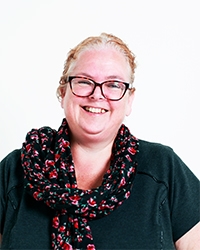
Tanja de Bie. Co-chair Employee Council SEA, Online platforms, Community management, e-moderation & social media, Storytelling, game design & world-building
Tanja has always been excited about the possibilities of connecting to the world through technology and understanding the behaviour of people in the digital space. There are things you can and must do to control the trolls & haters, but online communities remain great opportunities for interaction and collaborative projects. Tanja has a background in History, management and online roleplaying with an activist track record on education quality.
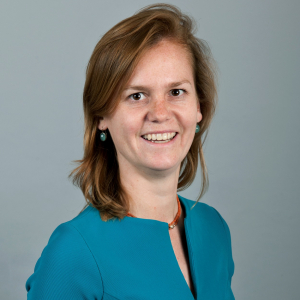
Carlijn Bergwerff works as assistant professor at Leiden University at the Institute of Education and Child Studies. In the past years she has been involved in many bachelor’s and master’s courses, ranging from teaching clinical skills to giving lectures on digital interventions in mental healthcare. Carlijn aims to innovate the academic education, for instance by introducing interactive videos or Virtual Reality in a bachelor’s course on conversation skills. Carlijn studies the effects of these playful approaches in academic education. As Comenius Teaching Fellow, Carlijn is part of the ComeniusNetwork for educational innovation.
In her research, Carlijn focuses on using Virtual Reality in mental healthcare, for instance as part of trauma therapy for children and adolescents.
Besides, Carlijn works as child psychologist in clinical practice.
Feel free to connect with Carlijn on LinkedIn.
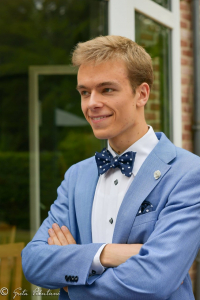
Liudvikas Pikutis is a student at Leiden University studying the Master of Psychology, specialising in Methodology and Statistics. He is also currently working as a student assistant at Leiden University for the Leiden Learning & Innovation Centre. His interests are education, coding and games. One of his dreams is to see a change in the education system, how teachers and students approach schools and universities.
Listen to Playful Learning.
Humanities’ alternative model for academic development
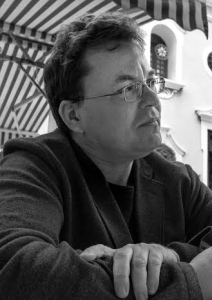
Philippe Peycam is a historian and the Director of the International Institute for Asian Studies in Leiden that works both within and outside of LU, to facilitate a number of intersectional programs as catalysts for critical thinking, public action and social change. One of these programs is the Humanities Across Borders Programme that began in its first phase in 2016 to experiment with experiential pedagogies beyond the classroom. Its manifesto, which was jointly written by partners from West Africa, South and Southeast Asia, Taiwan, Europe, USA, and Mexico reads as below:
“We envision a university that reclaims its rightful civic role and responsibility at the confluence of multiple nodes of knowledge exchange. Our goal, as educators and institutions, is to identify and explore the expansive variety of modes and contexts of acting, in the world. We propose to create border-crossing spaces within and outside universities where academics, students, and communities learn from, and act and work with, each other, in an atmosphere of mutual respect and recognition.”
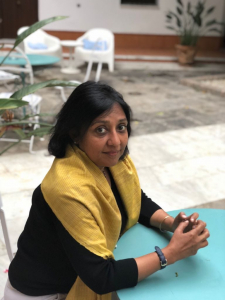
Aarti Kawlra is a social anthropologist and Academic Director of the HAB program. The program’s primary objective is to support ‘situated learning’ within a humanist model of curricula development. HAB attends to community-based lived or experiential knowledge often relegated to the margins as non-expert knowledge. Four syllabi tracks based on themes of universal meaning (food, craft-making, words-in-use, space/place) animate this model of education, co-created in situ with local partners, in dialogue with other localities in the world.
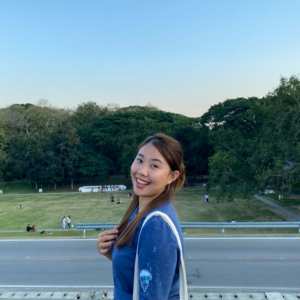
Orraya Chawnan is a Masters student at the Dept Ethnicity and Development of Social Sciences in Chiang Mai University, Thailand. She has been part of the HAB “Living in and with the forest’ project of CMU as a field researcher among the Huay Hin Lad Nai community and has participated in the Reading Leiden Experiential School organised by HAB in 2019.
Listen to Humanities’ alternative model for academic development. .
The future of XR within education
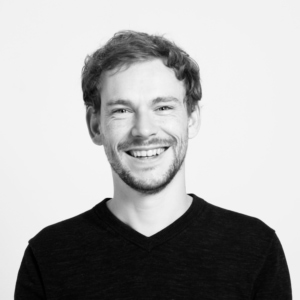 Thomas Ginn is an educational storyteller and an extended reality director at Leiden Learning & Innovation Centre. Using his knowledge in the field of education, filmmaking and storytelling, Thomas empowers educators to form rich and engaging learning experiences.
Thomas Ginn is an educational storyteller and an extended reality director at Leiden Learning & Innovation Centre. Using his knowledge in the field of education, filmmaking and storytelling, Thomas empowers educators to form rich and engaging learning experiences.
Connect with Thomas on LinkedIn. Read about his work at the Centre for Innovation using XR in education.
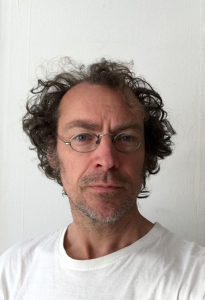
Sander Veenhof is a Dutch creative technologist with a background in computer science and the arts. After graduating at the VU university he studied ‘interaction design for unstable media’ at the Gerrit Rietveld art academy where he now teaches ‘augmented realities’.
Veenhof is fascinated by AR not only because the technology adds a visual layer to our physical reality, which opens up a lot of possibilities. But his fore most interest is the fact that AR turns our physical world into a programmable universe, which gives a lot of freedom. But worries too, because we’re going to be programmable entities too once we’re going to wear the next generation of AR glasses.
The “Futurotheque” and his “Be Your Own Robot” project are hands-on explorations of this speculative future scenario. Both projects aim to get a better understanding of the steps we need to take and the steps we need to resist when gradually becoming part of a semi-digital ecosystem. https://sndrv.nl/
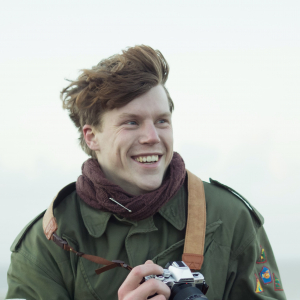
Mitchell Bosch is a thesis-writing master student in the Media Technology master programme at Leiden University. During this period, he has tutored first year Media Technology students and assisted the ‘On being a scientist’ Bachelor course.
Before this he travelled Europe in a van doing voluntary work, from making websites to product photography in a Buddhist centre.
Currently he is working for XR ERA, a project and community founded by the Leiden Learning & Innovation Centre, helping them use XR to enhance education and research.
Connect with Mitchell on LinkedIn.
Listen to The future of XR within education.
Convenience of Digital Tools
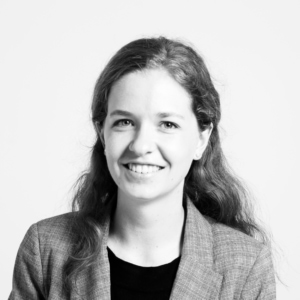 Joanna van der Merwe is the Privacy and Protection Lead at the Leiden Learning & Innovation Centre at Leiden University. In this role she aims to keep the University at the forefront of responsible implementation of emerging technology and data-driven practices and preparing them for the future. Her previous experience includes research in collaboration with the Land Warfare Centre of the Netherlands Ministry of Defence, focusing on Artificial Intelligence and the future of combat. Joanna has also worked on early warning systems for mass atrocities at the Signal Program on Human Security and Technology at the Harvard Humanitarian Initiative. She holds an MA in International Relations and Global Conflict in the Modern Era, from Leiden University. She also continues to advise and speak on data and AI in a variety contexts such as policy-making and the future of warfare and defence.
Joanna van der Merwe is the Privacy and Protection Lead at the Leiden Learning & Innovation Centre at Leiden University. In this role she aims to keep the University at the forefront of responsible implementation of emerging technology and data-driven practices and preparing them for the future. Her previous experience includes research in collaboration with the Land Warfare Centre of the Netherlands Ministry of Defence, focusing on Artificial Intelligence and the future of combat. Joanna has also worked on early warning systems for mass atrocities at the Signal Program on Human Security and Technology at the Harvard Humanitarian Initiative. She holds an MA in International Relations and Global Conflict in the Modern Era, from Leiden University. She also continues to advise and speak on data and AI in a variety contexts such as policy-making and the future of warfare and defence.
Listen to Joanna on FIT4PRIVACY Podcast | Connect with her on LinkedIn or Twitter.
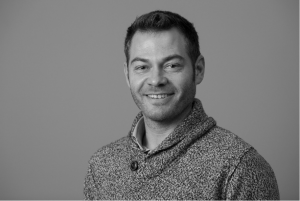
Daan Romein works as team leader professional development and educational innovation at Leiden University. He has worked in 15 countries on projects related to educational development and teacher training. He is involved with topics such as course design, curriculum development, internationalization of higher education and inclusion and diversity.
LinkedIn | ICLON Hoger Ondewijs Blog | Roadmap to flexible education

Bastian Mielke is a second-year student at Leiden University College (LUC) The Hague. There, he studies Global Public Health with a focus on Psychology and serves as a Residential Assistant for both his floor and the wider student community that all live in the residential building on Anna van Buerenplein for their first two years of study. His interest in philosophy and conversations about the most important questions of live voices itself in Bastian’s position as a founding member and Chair of the “Tea and Philosophy”-Committee at LUC which facilitates weekly sessions on topics ranging from “Happiness and how to reach it” to “Substance Abuse” and “Loneliness”. Committed to the LUC student community and the feeling of togetherness it brings about, Bastian is concerned about the adverse effects that using online education tools may have on both of them.
Listen to Convenience of digital tools.
Education for sustainability: A look into the future
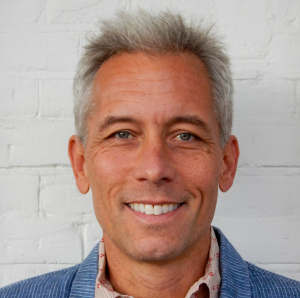 David Zetland is a university lecturer at Leiden University College, where he convenes the Governance, Economics and Development major and teaches on the commons, economics, entrepreneurship, and sustainability. He received his PhD in Agricultural and Resource Economics from the University of California, Davis in 2008, and held positions in Canada, the Netherlands, Saudi Arabia and the US before coming to LUC. He has published over 20 academic articles and chapters, dozens of popular pieces, over 150 reviews, two collections of climate-fiction short stories, and three books: The End of Abundance (2011), Living with Water Scarcity (2014), and The Best of Aguanomics (2018) and edited and published two collections of climate disruption stories (Life plus 2 Meters, Volumes I and II). He reaches the public via his One-handed Economist blog and Jive Talking podcast. David lives in Amsterdam, where he enjoys coffee, genever and many varieties of water. Check out his website, Kill Your Status Quo.
David Zetland is a university lecturer at Leiden University College, where he convenes the Governance, Economics and Development major and teaches on the commons, economics, entrepreneurship, and sustainability. He received his PhD in Agricultural and Resource Economics from the University of California, Davis in 2008, and held positions in Canada, the Netherlands, Saudi Arabia and the US before coming to LUC. He has published over 20 academic articles and chapters, dozens of popular pieces, over 150 reviews, two collections of climate-fiction short stories, and three books: The End of Abundance (2011), Living with Water Scarcity (2014), and The Best of Aguanomics (2018) and edited and published two collections of climate disruption stories (Life plus 2 Meters, Volumes I and II). He reaches the public via his One-handed Economist blog and Jive Talking podcast. David lives in Amsterdam, where he enjoys coffee, genever and many varieties of water. Check out his website, Kill Your Status Quo.
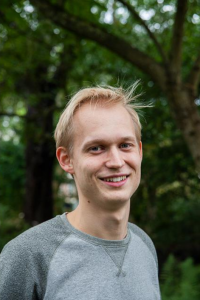
Soemano (Soem) Zeijlmans worked until recently as the Sustainability Strategy & Education Coordinator at Leiden University Green Office– the university’s student-run sustainability department. At the Green Office, his tasks included working with staff and students to include sustainability in the university’s curriculums and to consult the university on sustainability strategy. Among others, he co-created the online Leiden University Sustainability Network and co-organised a conference to empower co-participation to work towards a sustainable university.
Additionally, Soem is a recent graduate of Leiden University College, The Hague, where he majored in Governance, Economics, and Development. With his company Goodrise , he works as a freelance sustainability consultant and gives impact training to organisations that campaign for a better world.
Listen to David and Soem in Education for sustainability: A look into the future.
Series 1 Guests
Education in 2030: Part 1 Guests
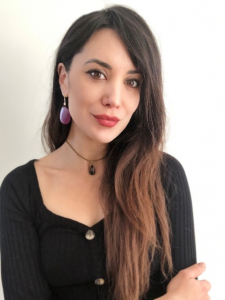 Dr María Gabriela Palacio is a University Lecturer at the Faculty of Humanities of Leiden University. She teaches courses on political economy of Latin America and Practising International Studies (PRINS) at the BA International Studies. She holds a PhD in Development Studies by the International Institute of Social Studies (ISS). Having held posts in more than one academic discipline, from economics to critical development studies, and moved across diverse geographical locations, she has gained great appreciation for interdisciplinary work, localised research, and accessible output. Her research contributes to critical social policy. Situated within development studies and informed by political economy, anthropology, and sociology, it seeks to understand how social policy shapes political and social identities. Most of her empirical research has focused on Ecuador, though she has written more broadly about Latin America. She is also the chair of the network LUDEN, tackling racism and other forms of exclusion at Leiden University’s working and learning environment.
Dr María Gabriela Palacio is a University Lecturer at the Faculty of Humanities of Leiden University. She teaches courses on political economy of Latin America and Practising International Studies (PRINS) at the BA International Studies. She holds a PhD in Development Studies by the International Institute of Social Studies (ISS). Having held posts in more than one academic discipline, from economics to critical development studies, and moved across diverse geographical locations, she has gained great appreciation for interdisciplinary work, localised research, and accessible output. Her research contributes to critical social policy. Situated within development studies and informed by political economy, anthropology, and sociology, it seeks to understand how social policy shapes political and social identities. Most of her empirical research has focused on Ecuador, though she has written more broadly about Latin America. She is also the chair of the network LUDEN, tackling racism and other forms of exclusion at Leiden University’s working and learning environment.
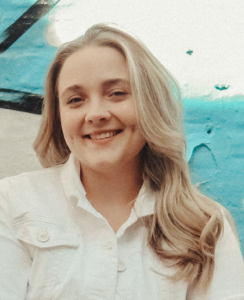 Nicole is currently a third-year BA International Studies student at Leiden University. Having previously studied law in her home country, Austria, Nicole was eager to learn more about the international effects of globalisation from a multi-disciplinary perspective. She developed a special interest in South Asian religion, cultural appropriation, and inclusivity. Additionally, she was also the President of the Study Association of Leiden University (BASIS) in 2019 until 2020 where her main responsibilities were creating and leading a long and short term vision for 26+ committees as well as leading her board towards organising over 160 events. Currently she is a Student Assistant at the Leiden Learning & Innovation Centre where she hopes to achieve an integrated and efficient Mentoring system for all incoming Leiden University students as part of the central coordination team.
Nicole is currently a third-year BA International Studies student at Leiden University. Having previously studied law in her home country, Austria, Nicole was eager to learn more about the international effects of globalisation from a multi-disciplinary perspective. She developed a special interest in South Asian religion, cultural appropriation, and inclusivity. Additionally, she was also the President of the Study Association of Leiden University (BASIS) in 2019 until 2020 where her main responsibilities were creating and leading a long and short term vision for 26+ committees as well as leading her board towards organising over 160 events. Currently she is a Student Assistant at the Leiden Learning & Innovation Centre where she hopes to achieve an integrated and efficient Mentoring system for all incoming Leiden University students as part of the central coordination team.
Listen to María and Nicole in Education in 2030: Part 1.
Education in 2030: Part 2 Guests
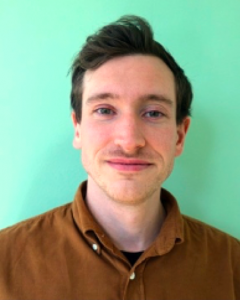 Jaap Brons teaches humanities at Academie 10, an innovative high school in Utrecht, the Netherlands. Learning trough wonder is a central concept at Academie 10. In his lessons Jaap stives to achieve this through project-based assignments and giving students the freedom to research the subjects they want to learn about. He has a background in history and is currently doing his master’s in history education at Hogeschool Amsterdam.
Jaap Brons teaches humanities at Academie 10, an innovative high school in Utrecht, the Netherlands. Learning trough wonder is a central concept at Academie 10. In his lessons Jaap stives to achieve this through project-based assignments and giving students the freedom to research the subjects they want to learn about. He has a background in history and is currently doing his master’s in history education at Hogeschool Amsterdam.
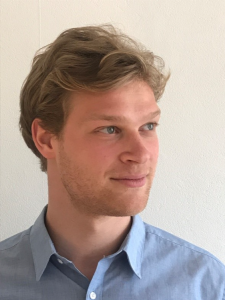 Pelle is a student of the MA International Relations and the MA Latin American Studies at Leiden University and an active member of the University’s community. Also, he is a student assistant at the Leiden Learning & Innovation Centre, where he researches innovation in the Dutch government.
Pelle is a student of the MA International Relations and the MA Latin American Studies at Leiden University and an active member of the University’s community. Also, he is a student assistant at the Leiden Learning & Innovation Centre, where he researches innovation in the Dutch government.
Listen to Jaap and Pelle in Education in 2030: Part 2.
Education in 2030: Part 3 Guests
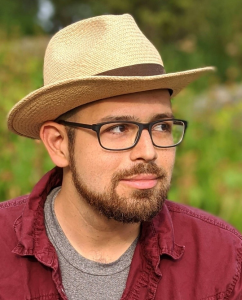 Marcello A. Gómez-Maureira — or ‘Maro’ — is a game researcher and lecturer at Leiden University, and co-founder of the small interactive media development studio “Dandy Unicorns”. Curious about the intricacies of good design, he has studied and worked in engineering, graphic design, video game development, and academic game research. His professional background informs his development work and his perspective as an educator, where he motivates students to draw from their unique range of experiences to shape their own careers. Maro publishes prolifically and has successfully attracted scholarships and grants as a result. He is drawn to research topics that explore the impact of interactive and playful design on emotions, and the potential of intentionally evoking even complex emotional states through design. Together with his equally dandy partner-unicorn, he develops games for research and education purposes that puts theory into practice.
Marcello A. Gómez-Maureira — or ‘Maro’ — is a game researcher and lecturer at Leiden University, and co-founder of the small interactive media development studio “Dandy Unicorns”. Curious about the intricacies of good design, he has studied and worked in engineering, graphic design, video game development, and academic game research. His professional background informs his development work and his perspective as an educator, where he motivates students to draw from their unique range of experiences to shape their own careers. Maro publishes prolifically and has successfully attracted scholarships and grants as a result. He is drawn to research topics that explore the impact of interactive and playful design on emotions, and the potential of intentionally evoking even complex emotional states through design. Together with his equally dandy partner-unicorn, he develops games for research and education purposes that puts theory into practice.
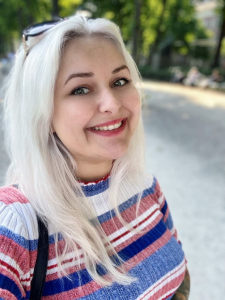
Juliette Petra Rose van der Laarse: I studied Game development, after which I made the switch to Leiden University to study Korea studies were my academic interests grew. I worked as a freelance developer and designer outside of college to pay for my bills and got the opportunity to work on a bigger project with a team which led me to found my first startup in AR and VR development. After this I followed courses from multiple faculties and programs, including Law, Securitu Studies, and Urban Studies, and I am now working on an educational game that teaches physics to secondary school students. I am taking online programming courses with a focus on big data and AI, and started with the parttime bachelor Philosophy at Leiden University this September.
If I were to describe myself I am very eager to learn and most of my days and time are filled with studying either subjects or new skills.
Listen to Marcello and Juliette in Education in 2030: Part 3.
Sharing & Downloads
Share this page: www.centre4innovation.org/what-if-education-podcast
Tweet this page | Share this page on Facebook | Share it on LinkedIn
Share our Spotify or Apple links.
Embed the Spotify player on your website:
<iframe src=”https://open.spotify.com/embed-podcast/show/6MqSIsqSV0UKipGQRQ4Llf” width=”100%” height=”232″ frameborder=”0″></iframe>
Download the podcast thumbnail, 1200px banner or the 2000px banner.
Useful links
Jowan Österlund (Biohax International) on microchip implants | 15th European Trend Day
Biohacking – the next step in human evolution or a dead end? | Jowan Österlund | TEDxBratislava
The complicated truth about China’s social credit system
Social Credit System Coming To China, With Citizens Scored On Behavior | NBC Nightly News
Black Mirror in Beijing … China’s new social credit scoring system is being implemented right now

